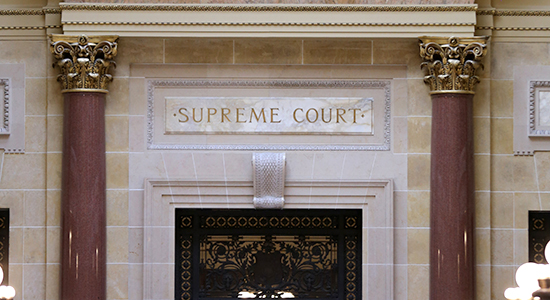
May 25, 2016 – The Wisconsin Supreme Court has ruled that a district attorney cannot stop the Wisconsin Department of Justice from releasing public records about him to a local newspaper, concluding district attorneys don’t have a statutory right to block such records from being released.
In 2013, the Lakeland Times in Minocqua sent a public records request to the Department of Justice (DOJ), seeking records pertaining to Vilas County District Attorney Albert Moustakis. The newspaper wanted information about any complaints or investigations against Moustakis in his capacity as district attorney.
The newspaper sought information on complaints, even ones without merit, and wanted DOJ’s communications with Moustakis going back to 1995, when he first took office.
Ultimately, DOJ prepared a response with redactions. The response contained records of complaints the DOJ found to be unsubstantiated. DOJ informed Moustakis that it would be responding, and sent a “courtesy copy” to him before releasing them.
Before the records were released, however, Moustakis filed an action to stop DOJ from releasing the records, under Wis. Stat. section 19.356(4), which allows a “record subject” to “restrain the authority from providing access to the requested record.”
Moustakis said a former political rival made the allegations listed in the complaints, they were found to be unsubstantiated, and did not lead to any charges.
However, the circuit court dismissed the action, concluding that a record subject’s ability to restrain the release of records only applies to three narrow categories of records.
Moustakis had argued that records about him fall into one of those categories, under section 19.356(2), which applies to records “containing information relating to an employee that is created or kept by the authority and that is the result of an investigation into a disciplinary matter” or potential violation of a law, regulation, ordinance, or policy.
 Joe Forward, Saint Louis Univ. School of Law 2010, is a legal writer for the State Bar of Wisconsin, Madison. He can be reached by email or by phone at (608) 250-6161.
Joe Forward, Saint Louis Univ. School of Law 2010, is a legal writer for the State Bar of Wisconsin, Madison. He can be reached by email or by phone at (608) 250-6161.
Under section 19.32(1bg), “employee” means “any individual who is employed by an authority, other than an individual holding public office or a state public office, or any individual who is employed by an employer other than an authority.”
Moustakis conceded that district attorneys hold a “state public office.” But he argued that he is still an “employee” because he is “employed by an employer other than an authority.” That is, he argued that his employer is the State of Wisconsin, and the State of Wisconsin is not among the offices specifically identified as an “authority.”
The circuit court ruled that Moustakis was not an “employee.” A state appeals court affirmed. In Moustakis v. Wisconsin Department of Justice, 2016 WI 42 (May 20, 2016), a Wisconsin Supreme Court majority (4-3) affirmed, concluding that district attorneys are not an “employees” and Moustakis could not challenge the release of records.
DAs Not Employees Under Public Records Law
The majority rejected Moustakis’s claim that he is still an employee, under section 19.356(2), because his employer is the State of Wisconsin.
“[A]lthough the statutory definition of ‘authority’ does not explicitly include the State, the statutory definition of ‘authority’ does include a ‘state or local office’ and ‘an elective official,’” wrote Justice Shirley Abrahamson for the majority. “A district attorney in Wisconsin is a ‘state office’ and a district attorney is also an elective official.”
Justice Abrahamson also noted that any distinction between holding public office and being employed by a public office “is unsupported by law, creates confusion, and is contrary to any reasonable reading of the public records law.”
Based on these rulings, the majority concluded that Moustakis was not entitled to notice that the records would be released, and could not seek judicial review to restrain the DOJ from releasing them before they were released.
The majority affirmed and remanded the case for review of other issues that Moustakis asserted in an amended complaint (which were never decided in circuit court), including a challenge to the constitutionality of section 19.356.
Concurrence/Dissent
Chief Justice Patience Roggensack, joined by Justices Annette Ziegler and Michael Gableman, agreed that Moustakis was not an “employee” under section 19.356.
But Roggensack dissented “because the majority chooses not to address obligations of the Department of Justice (DOJ) under Wis. Stat. § 19.356(9)(a) and (b), which must be met prior to release of the public records that the Lakeland Times seeks,” she wrote.
Section 19.356(9)(a) says a record subject who is “an officer or employee of the authority holding a local public office or a state public office” must receive written notice, by certified mail or personal service, if an authority chooses to permit access to records.
Section 19.356(9)(b) then allows the record subject to “augment the record to be released with written comments and documentation selected by the record subject.”
“Nothing in the record shows that Moustakis received the notice required by § 19.356(9)(a), and without notice sufficient to satisfy § 19.356(9)(a) and (b), the DOJ is without statutory authority to release records that are at issue here,” Roggensack wrote.
